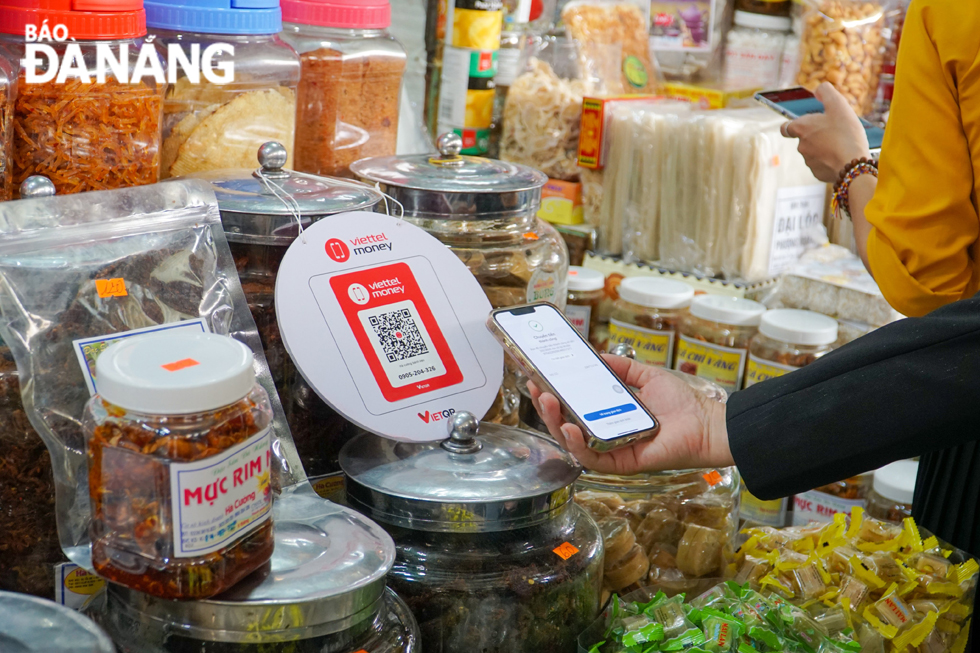Market 4.0: highly practical model
"Sister, please sell 1kg of alum fish, I will make money transfer to you". "Thank you, I got it." Or “Sister, give me a few thousand VND worth of onions, cilantro, and a bunch of water spinach. But do you have small change, because I only have a 500,000 VND note. A fact that leaving the fish and meat store without having to hold the wet notes clinging to the fishy smell whilst sellers - buyers do not have to rush around to get some change is a conspicuous image in the traditional market in the digital area today.
 |
| With just a simple scan of the VietQR code, market-goers in Da Nang can easily pay for their purchase. Photo: QUYNH TRANG |
Up to now, there are 8 markets in the city, namely Con, Han, Dong Da, An Hai Bac, Bac My An, Cam Le, Hoa Khanh and Tuy Loan, that apply cashless payment method. With the market model 4.0, small businesses and people can buy and sell all items at the market by scanning QR codes or transferring money via phone numbers on the Viettel Money mobile app.
The Da Nang branch of Military Industry - Telecoms Group (Viettel Da Nang) has built deposit/withdrawal points in the 8 markets and nearby areas, equipping VietQR codes for more than 1,700 small merchants in the markets, connecting with 37 banks and e-wallets to create Viettel Money accounts to support market traders and customers to make transactions of transferring, depositing, withdrawing money and online trading.
According to a report by Viettel Da Nang, the unit implementing the Market 4.0 app, after 6 months of implementing cashless payment at the aforementioned markets, 97% of the small businesses regularly conduct electronic payment transactions. This result shows that the promotion of communications on digital transformation and implementation of non-cash payments among women, housewives and female traders, initially achieved positive results.
Because women make up more than half of society, most of them play the role of "key box" of the family. Once sellers and buyers get used to non-cash payments, the application of this highly practical model to other markets will be convenient and easy. According to the plan, from now until the end of this year, Viettel Da Nang will deploy the Market 4.0 model at 30 traditional markets city-wide.
According to the report of the Viet Nam E-commerce Association, Da Nang is in the top 3 leading localities in the e-commerce index in 2021, after Ha Noi and Ho Chi Minh City.
With the highest percentage of people using mobile phones in the country with a rate of 276 devices/100 people and 105 smart phones/100 people, along with O nearly 2 social network accounts/person on average, Da Nang sets a target that, by 2025, the digital economy will account for at least 20% of the city's GRDP, and 30% by 2030.
The proportion of the digital economy in each industry and field now reaches at least 10% and will be at least 20% by 2030, especially the tourism and finance - banking and e-commerce sectors with at least 30%. The rate of enterprises using e-contracts reaches more than 80% for the time being and eyes for a target of 100% by 2030.
Market 4.0 model is an inevitable trend in the digital era, representing smart consumption, helping to improve accuracy, convenience and speed in each transaction. Moreover, it also creates transparency in expenditures and transactions, helps money flow to circulate and promotes e-commerce development.
In order for Market 4.0 to take shape soon, it is necessary to promote communication and dissemination of knowledge about non-cash payments - especially information safety and security of digital financial services so that users can rest assured to use payment-enabled applications.
Besides, in order to change the habit of ‘shopping with cash’, it is necessary to develop and implement a community education programme on non-cash payment. At the same time, it is necessary to set up many cashless payment points not only in markets but also in food and beverage businesses and service establishments to promote the cashless economy, thus opening up more trade opportunities, and contributing to the growth of digital transformation in 3 areas of digital government, digital economy and digital society.
Reporting by QUYNH TRANG - Translating by A.THU








